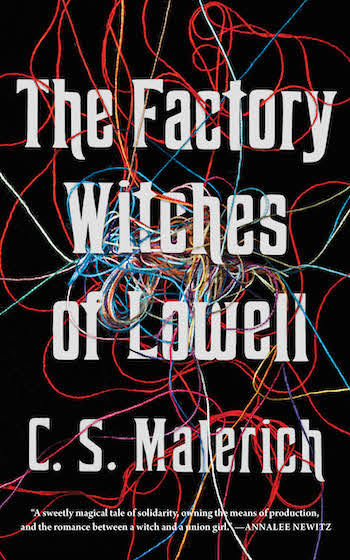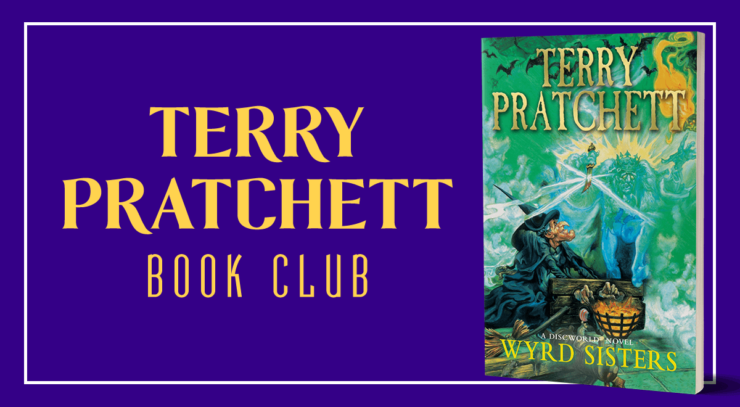More witches, more mayhem, more Shakespearean intrigue in this round. Grab a cauldron, everyone. It’s time to hang out with some Wyrd Sisters.
Summary
There’s a storm and Granny Weatherwax, Nanny Ogg and Magrat Garlick are having a coven meeting (Magrat’s idea, being the junior member of the group). King Verence of Lancre has just been assassinated, and Death comes to collect him, but realizes that this fellow is set to be a ghost for a while. His child has been stolen, however, and he can’t go after the boy—you have to stay where you died when you’re a ghost. An escaping servant with the baby bundle is pursued by soldiers, and they all come upon the witches. The servant hands over the baby before being killed. One of the soldiers demands that Granny Weatherwax turn the child over to him, but she refuses, and his cohort stabs him (he’s from the area and knows you don’t mess with witches). Granny tells him to head off and become a sailor. They’re left with the baby and the crown. In the meantime, Verence is getting to know King Champot, another ghost king who died a millennia ago. Duke Felmet, the one who arranged Verence’s assassination at the behest of his wife the Duchess, isn’t feeling too great about the whole thing since the crown is nowhere to be found.
Buy the Book


The Factory Witches of Lowell
The witches are trying to decide what to do with the baby and, more importantly, the crown. Granny knows they can’t merely dispose of the thing; it’ll turn back up immediately, as is the way of things. She tries the crown on while the other two are out of the room and feels its history run through her head, making her even more determined to see it gone. Magrat mentions that she used to see lots of crowns when her witch mentor, the departed Goodie Whemper, used to take her to see traveling theater troupes. Granny Weatherwax reckons that’s the perfect place to bring the baby and the crown. Granny and Nanny have never been to the theater and do not understand that it’s all pretend, which causes something of a ruckus. At the end, they are approached by Olwyn Vitoller, the troupe’s manager, and ask to speak with him privately. Meanwhile, Lady Felmet is questioning the chamberlain about witches in the kingdom, and where they can be found, and their status as taxpayers. She means to find the women who got the young prince and the crown, of course.
Granny talks to Mr. Vitoller and his wife, who have no children. She suggests that they take this child for their own, saying they’re his godmothers and neglecting to tell them his history; the couple agrees despite having very little money. Granny gives them quite a bit to help the child get by—when Vitoller asks why she hadn’t led with the money, Granny points out that they wouldn’t have been a good option if they could be bought. Magrat slips the crown into the theater troupe’s trunk of costumes and such. They watch the troupe depart from Magrat’s crystal ball, and she suggests that they give the child three gifts as his witch godmothers. They help Nanny inside (she got wasted at the pub) and set about granting the prince his gifts—only they can’t agree on what they should be, so they decide to grant the gift separately. Magrat gives him the gift of making friends easily, Nanny gives him a good memory, and Granny gives him the gift of being whoever he thinks he is.
The duke and duchess send men to arrest Granny, but she gives all the men tea and buns, and the sergeant reports as much back to Duke Felmet. The duke is having a hard time after killing Verence and keeps trying to scrub his hands clean. He decides to enlist the aid of the Fool (whose whole family have been Fools), while the duchess later berates him for being unwilling to move against the witches. Granny, Nanny, and Magrat have another coven meeting and reminisce about old King Verence—they’re worried about the duke because he seems a bit clever and also doesn’t want anyone to say he killed the king. The tax man returns to explain that he cannot collect taxes from the witches because they looked at him, and Duke Felmet tells him to have the torturer slot him in on the schedule somewhere. He asks the Fool to make him laugh, and when that doesn’t work, he decides they’ll go hunting instead.
Book Club Chat
We’re back to Granny and a couple of fellow witches, only this time she’s featuring in a book that’s about 75% Shakespearean parody, with a bunch of witchcraft history, and theater jokes, and other sundry thrown in. Indeed, there are so many bits of Shakespearean dialogue thrown into this book that it’s entirely pointless to try and highlight them all (though you can certainly pick them out yourself, or find them on L-space if you have a mind to). The point is, there are lines from Midsummer Night’s Dream, and King Lear, and references to Julius Caesar, and on and on, but mostly we’re looking at Macbeth—that’s where we’re getting the assassination and the duke scrubbing at his hands as an ode to Lady Macbeth’s “Out, damned spot!” Pratchett gives us that obsession from the start, however, because he’s got a lot to build on.
The title of this book works on multiple levels, as the witches of Macbeth are often referred to as the “weird sisters”, but his spelling of it as “wyrd” is not merely a ye olde affectation: Wyrd is the Anglo-Saxon and Norse concept for fate or destiny (for the Norse, this is the Norns), which gives the title a rich double meaning.
Because this story is based in Shakespeare tropes, we’ve also got a healthy bit of foreshadowing going on already, probably the best of them being Granny’s comment that “You’d have to be a born fool to be a king”, which is just excellent all things considered. There’s also the bit where Felmet gives the Fool grief for calling him “nuncle” because he’s certain he’d remember if they were related, which is sort of a foreshadowing of a misdirect in the plot, so there’s a lot going on here.
I’m not really sure that I can pick a favorite among the witches, but there is a special place in my heart reserved for Nanny Ogg and her many children and grandchildren who keep her house warm and clean and full of sustenance, and her propensity for getting drunk and singing bawdy songs (I know some fans have written out a full set of lyrics to “The Hedgehog Can Never Be Buggered At All”, though Pratchett himself never did), and her slightly more grounded, metropolitan approach to witching. In the end, I’m pretty sure that most people who endeavor to be witches would prefer the sort of life Nanny Ogg has put together for herself. But I’ve also got a soft spot for Magrat’s eagerness, even if I don’t really hold with all the pomp and edifice she wants to tack onto the profession.
Thing is, coming from a family of performers and musicians, this sort of story sits right where I live and play. Then there’s the little asides, like “the cats and the roller skates that were currently giving him trouble”, which is a reference to the Andrew Lloyd Webber musicals Cats and Starlight Express respectively, which makes this even more my thing. And having done a ridiculous amount of theatre in my youth, I have to appreciate the realism of Granny shouting at the stage through the whole play and everyone just going along with it, and the actors soldiering through it despite how a section of the audience keeps calling out their breathing-when-dead and their shabby boots.
Thing is, we get so caught up in celebrity these days that we often don’t address the fact that art can be a working class profession. Getting this troupe with their paper-and-stick sets and their shabby costumes and lukewarm audiences? That’s the real deal.
And there’s that extra layer of irony that the book centers on Macbeth when it’s dealing so much with actors and theatre because that is the “cursed” show, of course. You’re never supposed to mention Macbeth by name in a theatre for fear of great tragedy befalling you. (You’re supposed to call it “The Scottish Play” to avoid this issue.) But seeing as this is a book, Pratchett can parody and wink and nudge to his heart’s content.
Asides and little thoughts:
- The “droit de seigneur” joke is a reference to prima nocta, which was a rumored custom in medieval Europe where a local lord had the right to sleep with a bride on her wedding night. I keep thinking about the prima nocta jibe that Joss Whedon put in Avengers: Age of Ultron and how that was ultimately a poorly done rape joke, whereas this is actually pretty funny—because everyone keeps mistaking what the droit de seigneur is, and assuming that it has something to do with a pet?
- There’s a comment in here about “an architect who had heard about Gormenghast but hadn’t got the budget”, which is a great way to reference Gormenghast as a series.
- Okay, so I know that the joke that all the women are played by men in the theater is just a reference to what was common practice in Shakespeare’s time, but I find myself wondering why that would be true on the Disc…
- The fact that Nanny Ogg’s cat is named Greebo. It’s so good, but given that the word has definitely fallen out of popular vernacular, I’m a bit sad over the idea that the joke is probably already getting lost.
- Garlick is a proper witch surname of record in our own world, and others that Pratchett found in his research will be used in—you guessed it—Good Omens.
Pratchettisms:
The night was as black as the inside of a cat.
It was a good storm. There was quite effective projection and passion there, and critics agreed that if it would only learn to control its thunder it would be, in years to come, a storm to watch.
“No,” she said, on general principles.
Actors had a habit of filling all the space around them.
Granny could feel the shape of the future, and it had knives in it.
Above the hearth was a huge pokerwork sign saying “Mother.” No tyrant in the whole history of the world had ever achieved a domination so complete.
“Right,” said Granny, slightly mollified. She’d never mastered the talent for apologizing, but she appreciated it in other people.
Next week we’re reading up to:
“And now we will commence,” said the duchess.










